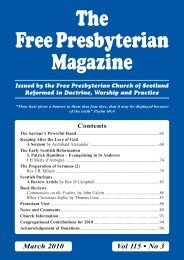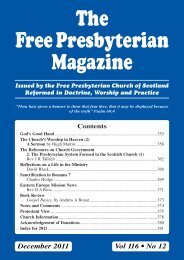April - the Free Presbyterian church of Scotland
April - the Free Presbyterian church of Scotland
April - the Free Presbyterian church of Scotland
Create successful ePaper yourself
Turn your PDF publications into a flip-book with our unique Google optimized e-Paper software.
Benefits <strong>of</strong> <strong>the</strong> Reformation to <strong>Scotland</strong> 109<strong>Scotland</strong>, <strong>the</strong> eye <strong>of</strong> God’s providence and blessing was upon <strong>the</strong> work <strong>of</strong><strong>the</strong> kirk session.7. A Provided Nation. The First Book <strong>of</strong> Discipline commended <strong>the</strong> careand relief <strong>of</strong> <strong>the</strong> poor in <strong>the</strong> strongest <strong>of</strong> terms: “Fearful and horrible it is,that <strong>the</strong> poor, whom not only God <strong>the</strong> Fa<strong>the</strong>r in His law, but Christ Jesus inHis evangel, and <strong>the</strong> Holy Spirit speaking by Saint Paul, has so earnestlycommended to our care, are universally so contemned and despised”. TheReformers noted <strong>the</strong> continual emphasis given to provision for <strong>the</strong> poor inScripture and sought to remedy <strong>the</strong> oppression that <strong>the</strong>y had experienced at<strong>the</strong> hands <strong>of</strong> <strong>the</strong> Romish clergy, under whom <strong>the</strong>re had been no regularprovision for <strong>the</strong>ir support. The corpse-presents, or <strong>church</strong> dues, that <strong>the</strong>local priest exacted at <strong>the</strong> time <strong>of</strong> a death were not only a significant burdento <strong>the</strong> poorest (a cow and <strong>the</strong> uppermost clothing) but were exacted in <strong>the</strong>harshest way under threat <strong>of</strong> excommunication.The historian Richard L Greaves remarks that “increasing a sense <strong>of</strong>responsibility for <strong>the</strong> poor was perhaps more difficult for <strong>the</strong> Protestantreformers than procuring desired changes in <strong>the</strong>ology and worship”. 14 TheFirst Book <strong>of</strong> Discipline remonstrated with <strong>the</strong> nobility, who were “now ascruel over <strong>the</strong>ir tenants as ever were <strong>the</strong> Papists, requiring <strong>of</strong> <strong>the</strong>m <strong>the</strong> tiends[ti<strong>the</strong>s] and whatsoever <strong>the</strong>y afore payed to <strong>the</strong> kirk, so that <strong>the</strong> Papisticaltyranny shall only be changed into <strong>the</strong> tyranny <strong>of</strong> <strong>the</strong> lord and laird”.Warning <strong>the</strong>m <strong>of</strong> “God’s heavy and fearful judgements”, <strong>the</strong>y were exhortedto “be content to live upon <strong>the</strong>ir just rents” and oppress <strong>the</strong> poor no more.Alexander Mitchell asserted that “<strong>the</strong> history <strong>of</strong> <strong>the</strong> world, <strong>the</strong> history <strong>of</strong> <strong>the</strong>Christian <strong>church</strong>, has few passages more noble than this, where <strong>the</strong>se poorministers, not yet assured <strong>of</strong> decent provision for <strong>the</strong>ir own maintenance,boldly undertake <strong>the</strong> patronage <strong>of</strong> <strong>the</strong> peasantry, and say <strong>the</strong>y would ra<strong>the</strong>rsuffer <strong>the</strong>mselves than ask that teinds should be exacted from those who hadbeen so long ground down”. 15Though <strong>the</strong>y were thus charged “in <strong>the</strong> name <strong>of</strong> <strong>the</strong> eternal God, and <strong>of</strong>His Son Christ Jesus” to have compassion upon <strong>the</strong> poor, <strong>the</strong> nobles turneda deaf ear and were unwilling to assign to <strong>the</strong> Church <strong>the</strong> ecclesiasticalrevenues which <strong>the</strong>y had seized. While adopted by <strong>the</strong> Church <strong>of</strong> <strong>Scotland</strong>in 1561, The First Book <strong>of</strong> Discipline never <strong>the</strong>refore became <strong>the</strong> law <strong>of</strong> <strong>the</strong>land and <strong>the</strong> Church continued to speak out against <strong>the</strong> treatment <strong>of</strong> <strong>the</strong> poorin later times.14 “The Social Awareness <strong>of</strong> John Knox: The Problems <strong>of</strong> Poverty and Educational Reform”,in Renaissance and Reformation XII:1, 1976, pp 36-48; <strong>the</strong> quotation is on p 36.15 The Scottish Reformation: Its Epochs, Episodes, Leaders, and Distinctive Characteristics,William Blackwood, 1900, p 181.
















